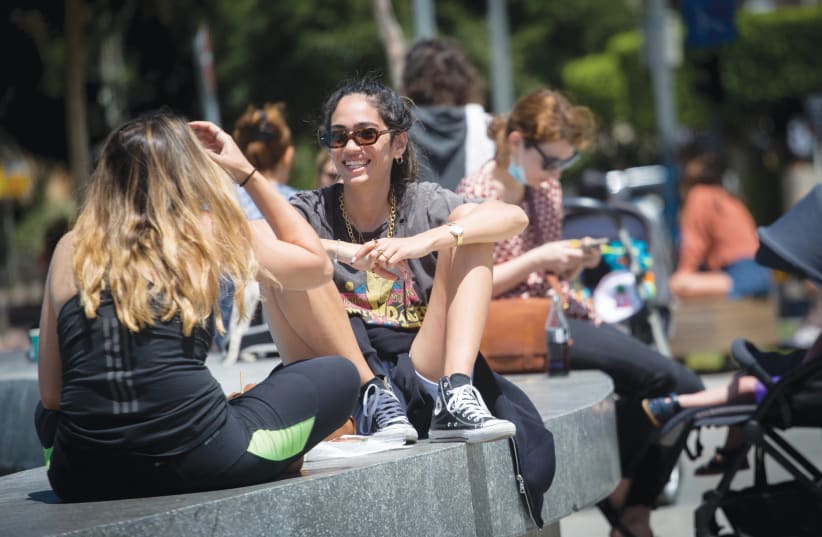‘I almost didn’t recognize you without your mask,” Shifra said as we bumped into each other at the park while walking our dogs.
“Same,” I replied.
It’s an ice-breaker greeting I’ve been hearing a lot lately. In addition to addressing the face-ensconcing awkwardness of the last year, it serves as a knowing acknowledgment of the strange transition we’re in, as we lurch from full-on COVID crisis to a new post-pandemic normal.
Truthfully, I wasn’t entirely sure what I was going to do when Israel’s Health Ministry eliminated the outdoor mask mandate on April 18. (Masks are still required indoors although, as with the CDC’s new guidance for the US, that too may be set to change shortly for the fully vaccinated.)
My first thought was, “Nah, I’m used to it by now, I’ll just keep wearing mine.” After all, it’s still not clear what’s happening with the growing number of variants. Nor do I know to what extent my cancer impacts the vaccines’ efficacy.
An alarming Israeli study found that for patients with certain types of blood cancers (like mine) who were sick but not currently receiving treatment, only 55% developed antibodies against the SARS CoV-2 virus, a significant drop from the 95% protection Pfizer promises for healthy individuals. For those with blood cancers in active treatment, it can plunge as low as 16%.
And yet, as soon as the new rule was issued, to my surprise, my mask was off. That’s led to another epiphany: a pent-up desire to socialize.
I had assumed that a year spent in and out of isolation would have blunted my social skills, pushing me more to my introverted side. Would I remember how to make small talk? Would I even want to?
Any worries vanished the first time I returned to synagogue. Mind you, I’m not much of a shul-goer, but being back in our community – outdoors at Jerusalem’s Nature Museum for now – I was practically in tears.
When services were over, I wanted to talk to everyone. All at once.
There’s a concept of “skin hunger,” where people who haven’t been touched in a long time desperately desire physical connection.That’s how I felt about socializing. I had a year to make up and I didn’t want to miss a single opportunity.
That’s not necessarily what the pundits expected.
We all have a finite amount of social energy, notes Celeste Headlee, author of We Need to Talk: How to Have Conversations That Matter. “We have been under such a cognitive load over the past year or so that there just may not be the space for [us to handle] two things in one day,” she told National Public Radio in the US.
The BBC’s Christine Ro framed the problem in a different way. “Have our social muscles atrophied in some way and do we now have to ‘retrain’ them?”
PROLONGED ISOLATION, for example, affects memory and verbal recall. So, if you’re finding it hard to remember certain words, lockdowns may be the culprit.
Headlee recommends that rather than jumping back whole-hog into socializing, try to do more listening than talking. Ask open-ended questions that take the pressure off you and allow the other person to shine.
Prof. Jane Webber of Kean University in New Jersey suggests we might be better off reconnecting first with people we already know. Ask yourself, “Do I really want to do a blind date? Do I really want to join a new club?”
“Increase your social interactions one small step at a time,” writes social worker Amy Morin in the “Ask a Therapist” column at VeryWell.com. “After all, you probably aren’t going straight from quarantine to a rock concert. Instead, you can start with meeting a friend outside for coffee.
“Isolation was not in any way fun. We survived it, but we still don’t feel [entirely] human,” Webber adds. “Life is full and fresh when we’re with other people.”
As if to prove that point, over the last few weeks, my socializing has been near insatiable. I’ve been to shul (twice now!); attended a party with several dozen people (mostly mask-less, outside) as well as a concert (at the Tower of David, also outdoors); ate at three restaurants (sitting indoors in two of them); and accepted our first invitation to a Shabbat meal at friends since the pandemic began.
Our social muscles “are fairly resilient,” Ro writes, noting that “accounts from places that have been less affected by COVID-19 suggest that it doesn’t take long to return to some version of a social normal.”
Israel was not exactly “less affected by Covid-19” over the past year, but we managed to pull it together at the last moment. We are now the international “beta country” for not just one but two grand experiments: What happens when you vaccinate the majority of adults in a short period of time, and how quickly will socializing bounce back?
While each of us is essentially just a “sample of one,” from what I’m seeing, at least among genetically gregarious Israelis, my individual experience of jumping back on the Sting-Ray seems fairly common. That should provide hope for countries still in the thick of their own COVID response.
The dogs were pulling us to their preferred next sniff stop when I spied something on Shifra’s face.
“Did you always have a nose ring?” I asked.
“No, I got it over the last year,” Shifra replied with a slight Bewitched twitch in the spot where I had noticed the piercing. “You just haven’t seen it because it was always under a mask!”
The writer’s book, Totaled: The Billion-Dollar Crash of the Startup that Took on Big Auto, Big Oil and the World, is available on Amazon and other online booksellers. brianblum.com
